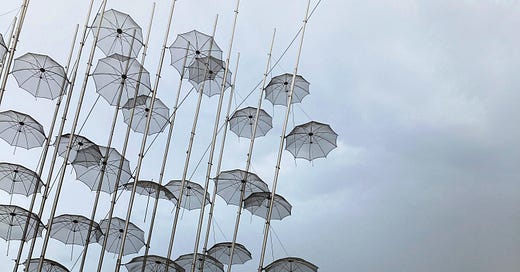On a recent train journey from London back home to Scotland. I sat across from a woman whom my body instantly recognised as Greek. She turned out to be from Athens, though she had gone to university in Thessaloniki, my hometown.
Did you know, she asked as the train groaned through Yorkshire, that the Thessaloniki metro opens tomorrow?
The first plans for the Thessaloniki metro were drawn before my parents were born. At the tail end of World War I, and following the 1917 fire that destroyed two thirds of the city, the Greek government thought that an underground rail network might reinvigorate Thessaloniki. For over a century, this promise of vigour remained unfulfilled.
Some of my earliest memories of political satire are connected to the construction of the metro in Athens. For Thessaloniki residents, the saga of the Athens metro confirmed long-held fears about what it meant to be the ‘second city’ of Greece. “All the good stuff goes to the capital,” the well-rehearsed chorus of complaint would go. “They have forgotten us.” It was not entirely clear who ‘they’ were, nor did it matter to the grievance, which gained momentum through a ‘we’ forged in a place made to feel peripheral. As Athens galloped towards modernity, Thessaloniki would be, once again, left behind.
Gallop, however, Athens did not. If the construction process were unfolding today, it would be the stuff of memes. In that era, it regularly made the evening news. Metro fever peaked in 1997, when a kiosk appeared to be swallowed underground by the industrial equivalent of the Loch Ness monster. Greek television only had a few channels at the time, meaning that it was possible to spend the precious few moments before bedtime surfing between different views of the ground parting, complete with a loud rumble and the kiosk disappearing below the street surface. Journalists would interview bewildered passersby, who would cross themselves, swear that the metro is cursed, and declare that if this metro were to ever materialise in Athens, they themselves would not use it.
Late-night comedians recognised their moment when they saw it. For weeks, the submerged kiosk remained a televised metaphor for Greece on the cusp of a new millennium. ‘Modernity’ was at once aspirational and a little bit out of reach. Not tasting it was both a signal that we had been forgotten or left behind and a reminder that, perhaps, we were not worthy of its promises. The perils of modernity were acknowledged mainly in whispers.
I had assumed that the Thessaloniki metro would remain a fable, always an arm’s length away from the present, just out of reach. The 1990s in Greece were maniacally oriented towards the future, with the word ‘εκσυγχρονισμός’ populating political campaigns. ‘Modernisation’ would make us European and Western—again, in that context, both promises were aspirational, hinting at something we ought to desire. When I left Greece in the early 2000s, the construction signs for the Thessaloniki metro had gone up, but they were not matched by corresponding activities. I knew how to live with this performance of progress, with the financing that always fell through. I knew to love my city for its past, that the past always seemed a bit safer for a Greek than the present or the future.
When it came to the Thessaloniki metro, the past came knocking. Roman, Byzantine, and early Christian artefacts lay on the path of the tracks. A headless statue of Aphrodite and a Roman bathhouse complete with that era’s underfloor heating system (!) were among the 300,000 antiquities that a team of over 300 archeologists were called to assess and tend to. Each effort to move the city towards the future unearthed a little more of its past. Those of us alive in the present are left to decide which heritage or promise to protect.
In the many years I made semi-regular returns to Thessaloniki, I continued to keep an eye on Greek news. During my visits, there seemed to be little discernible activity behind the banners announcing ongoing metro works. This, too, I found reassuring. Time moved at a pace I recognised.
After both my parents died, when I no longer had a home of my own to return to in Greece, I stopped regularly keeping up with the Greek news. The news, of course, still found me, but it was through friends. It was the webs of friendship that kept me tethered to the present of a place that now belonged mostly to my own past.
News of the imminent opening of the Thessaloniki metro found me through the stranger sitting across me on the London North Eastern Railway. She asked me how long I had been living away from Greece. “Since 2004,” I told her. “Oh, twenty years!” she repeated back to me. I found that surprising, as though “since 2004” should not correspond to “twenty years.” I have now been living elsewhere longer than I did in Greece, even though no single home quite stacks up as many years as my Thessaloniki home of origin. For as long as I have been away, time has been pegged to the year of my departure. I almost forgot to count what it has amounted to, to notice how long I have been gone.
For all I have forgotten, language remains. The Greek word for the machine boring holes through underground tunnels to build the metro is μετροπόντικας, roughly translating to ‘metro mouse.’ I had had no occasion to utter it, perhaps not since the infamous incident of the sunken kiosk in 1997, but sitting across this stranger on a train across England, the word fell out of my mouth. I had not consciously stored the word in my memory, but there it was. (I was delighted to subsequently learn that the English word for the same piece of equipment is a ‘mole.’ Same principle, different burrowing animal.)
As we crossed the border into Scotland, my fellow passenger informed me that the opening of the Thessaloniki metro the following day was slated to be eventful. There was an extreme weather warning, she said, with big storms in the forecast. Our own train journey had unfolded in the wake of a big storm, but we both knew that in Greece, such storms were a different event altogether.
I could picture it immediately: Buckets, typically used for mopping, would be set out on the gleaming floors of the metro stations. The brand new plaster would spring a leak. Someone would say “of course, this is what we are like,” the Greek equivalent of “this is why we can’t have nice things.” Someone else would comment on the mayhem being an act of God. A politician would still try to look European.
My new train acquaintance and I parted at Edinburgh Waverley, where a friend was picking her up, continuing the long tradition of Greeks not letting Greeks arrive anywhere alone. I boarded another train up the east coast of Scotland towards home. In the days that followed, I sought out news of the Thessaloniki metro opening. There were, indeed, buckets and mops and politicians and complaints. There was grumbling and pride. With artefacts exhibited at nearly every station, the past was on display—and perhaps a bit of the future was too.
I found the older passengers most moving. I do not know them and cannot speak to them. I only have access to their faces, photographed as part of this moment in time. Many appear to be as old as my parents would have been if they had lived to see this piece of history, and they wear the surprised expression of people who also did not think this moment would come to pass. They are old enough to remember the metro as just a promise. A promise repeated for over a century is not one it is advisable to attach oneself to. And yet, here we are—or here they are, moving among the ghosts of the city in a driverless wagon.
I may have retained Greek words I did not even know I still recalled, but it is hard to live by multiple clocks. I am a keeper of time in this corner of Scotland now. I know when to expect the first fieldfares of the autumn, when the snowdrops emerge from the ground, when the swifts might start calling in the sky. While my senses remained trained here, my hometown was changing. Thessaloniki did not remain frozen in time; only my imagination of it did. Its negotiations with the past and the future are ongoing. Fraught as these bargains with time may be, there is motion there, and with motion comes aliveness.
My Scottish friends want to know: Do I perhaps want to go back and ride the metro in Thessaloniki? Is there a way to sync the clocks? No, I tell them. I think I will stay here and wait for the snowdrops.
I’ve been on trains a lot lately, thanks to invitations to speak about my book Good Victims: The Political as a Feminist Question. If you’d like to learn more, I spoke to the Ethnographic Marginalia podcast about it, and about keeping our curiosity alive over time. Thanks, Alex Diamond and Sneha Annavarapu!
For the past year, along with wonderful colleagues/friends, I have been researching how practices of love and care help people imagine worlds in the wake of loss. This project has brought both grounding and buoyancy to my life, and it was a joy to discuss it with Polly Pallister-Wilkins on the European International Studies Association podcast. Have a listen, if you’d like.
Remember when I wrote about home waters two months ago? Well, since then, I have started swimming in the (North) Sea. I cherish how quickly the stories we tell ourselves about ourselves can become dated, how life outpaces its narration.
.





Oh, I really loved this. So much.
The mouse, the mole, your joyous post-swim face, what a delight.